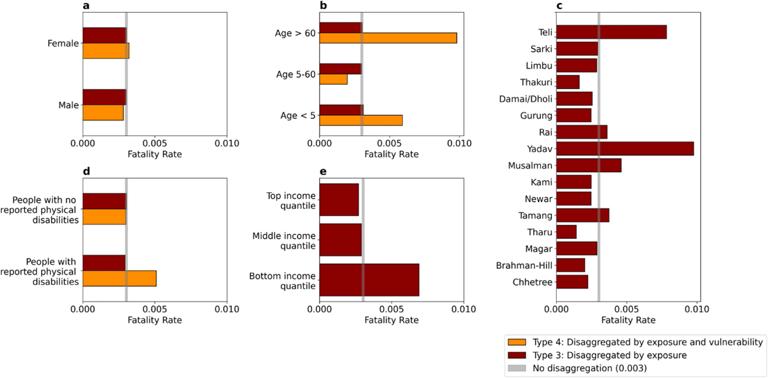Societal efforts to understand and mitigate threats posed by hazards are often informed by complex disaster risk models. Despite research demonstrating the disproportionate effects of disasters on vulnerable groups, current risk modeling approaches lack robust methods to account for such equity concerns. Consequently, efforts to develop evidence-based disaster risk management interventions may lack awareness of differential risks in the settings where they are applied. Here, we draw on the relevant literature to develop a typology for characterizing current approaches to incorporating equity into risk modeling. Using this typology, this study evaluated 69 risk assessments conducted by major international development organizations. This study found that only ~ 28% of risk models attempt a quantitative evaluation of the differential impacts of disasters and climate change. This study then used an equity-sensitive approach to reconstruct a recent risk assessment and show that important elements are missed when equity is excluded in disaster risk modeling.

Their findings demonstrate that, on the whole, contemporary disaster risk modeling practices do not adequately account for equity issues stemming from the differential impacts of natural hazards on marginalized groups. Few studies they examined considered these disparate impacts, and most that did, did so qualitatively. In addition, none of them accounted for differential vulnerability and only three accounted for welfare losses. They have also shown that there are straightforward methods available for doing so, with data that is currently available for many parts of the world, and that these methods can uncover disparities in the potential impact of hazard events on different groups that are elided by conventional approaches. While there is a need to further develop more sophisticated means of conducting equity-aware risk assessments, their results demonstrate that the potential aggregate effects of not accounting for equity across the large portfolio of studies that they surveyed are considerable and detrimental. In the worst case, risk assessments in their current form may prioritize investments in risk reduction in the wealthiest communities simply because they have more and higher value assets exposed, over less affluent areas where welfare losses would in fact be higher.
In the assessments they have evaluated, differential disaster risks experienced by marginalized groups can be the result of different exposure, vulnerability, or both. Disaggregating risk impacts through higher-order approaches, as they have argued, can both bring attention to groups that are more at risk and uncover potential causes of this differential risk. This stands to improve disaster risk management interventions in two ways. First, it would allow interventions to better identify the communities towards which risk reduction interventions would have the most impact. Second, it would support the design of more effective interventions appropriate for the specific communities affected. Furthermore, it would appear that incorporating equity into disaster risk modeling would be relevant across all phases of the disaster cycle, from mitigation to post-disaster recovery.
Despite some preliminary work in the academic literature, considerable effort is needed to develop techniques that better account for equity in disaster risk modeling. The use of their typology to evaluate contemporary assessments confirmed that few studies incorporate equity considerations. Their reassessment of a case study in Nepal found that traditional methods conceal disparities in the distribution of earthquake risk for diverse groups. Consequently, failing to account for equity may hamper the findings, conclusions, and policy options of current studies and DRM practices. International agencies such as development banks and the United Nations are major funders of these models. Just as important, they are leading voices in the broader community of practice that designs and implements risk assessment processes in the international development community. They are therefore well positioned to influence the sector. Scientists and researchers from academia and other institutions can drive such adoption through further development and refinement of techniques for conducting risk assessments that account for equity. While improving the models themselves does not resolve the underlying structural issues that produce inequitable outcomes during disaster mitigation and recovery, equity-aware models are an important tool toward this goal.
Sources:
Nature Communications Earth & Environment
https://www.nature.com/articles/s43247-023-01039-2 .
Provided by the IKCEST Disaster Risk Reduction Knowledge Service System
Comment list ( 0 )
